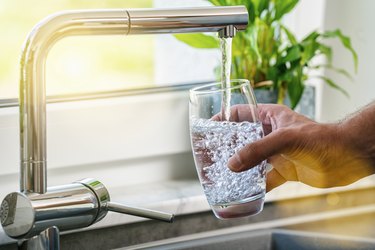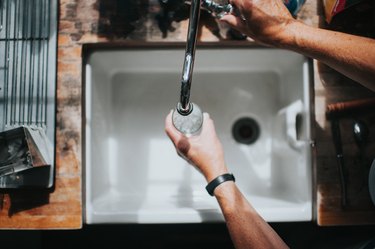
As if you don't have enough to worry about already, should you be concerned that your drinking water has nitrates in it?
You may have seen claims for nitrate-free water and wondered if this is something even worth your worry tolerance. In short, don't panic, your drinking water is probably safe.
Video of the Day
Video of the Day
Unless you are drinking certain types of water that are unsafe (more on that later) — which is never recommended — there is no cause for concern. Here's what you need to know about what nitrates are, how they can get into your drinking water and what to do about it.
What Are Nitrates vs. Nitrites?
Nitrates and nitrites are both found in the soil, water and plants. Having a clear understanding of nitrates and nitrites is key in making decisions about your nutritional health.
First, let's tackle nitrates. Nitrates are mainly consumed via the diet. In fact, vegetables are the highest source of nitrates in the diet, making up about 80 to 90 percent of all nitrates we eat, according to an extensive October 2018 review in Aging and Disease. The rest comes from drinking water and animal-based foods.
Nitrates are converted to nitrites in the body and the process forms nitric oxide — this is a good thing. Nitric oxide is a vasodilator, which opens up blood vessels and helps your blood flow better. That's great news for those trying to improve their blood pressure. So the natural conversion of nitrate to nitrite in the body is a healthy process.
Much of the conversation and controversy around nitrites is its use as a preservative for cured and processed meats, such as bacon, hot dogs and deli meats, and this is usually in the form of sodium nitrite.
While one of the end products of nitrate to nitrite is nitric oxide, another end product could be a substance called a nitrosamine, which could be harmful. Unfortunately, you have no idea if your body will produce nitrosamines, which can make it difficult to take control of your health.
According to the October 2018 review, there might be a link between inflammation and unhealthy bacteria in the gut and the formation of nitrosamines. This means that eating a diet high in anti-inflammatory foods, such as vegetables, fruits, olive oil and nuts and seeds is beneficial to keeping inflammation under control.
According to a December 2015 review in Nutrients, dietary nitrates are linked to a decreased risk for stomach cancer, mainly because of the source of most nitrates in the diet are from vegetables.
What's the Deal With Nitrates in Water?
The answer to the question of whether or not there are nitrates in your drinking water is yes. But the amount in public water systems (like tap water from your sink) or even in bottled water is measured and tightly regulated.
While some bottled water companies use nitrate-free as a marketing tool, other bottled water companies, in fact, have very low levels of nitrate in their water and usually non-detectable levels of nitrite. If you have a favorite bottled water, look for their annual analysis report online.
According to the Cornell University Cooperative Extension, mineral-reduced or distilled water generally has lower levels of nitrate than spring or regular mineral water.
So, where does the nitrate come from? Some of it is in the soil naturally, but levels have risen in the last 100 years mainly due to the use of inorganic fertilizer.
The Environmental Protection Agency set the maximum allowable amount of nitrate and nitrite allowed in drinking water in the United States to 10 mg/L and 1 mg/L, respectively.
The reason why nitrates in drinking water was even addressed was to protect infants against a condition called methemoglobinemia — sometimes called blue baby syndrome — according to a July 2018 report in the International Journal of Environmental Research and Public Health.
In infants, who have less acidic stomachs than adults, the ingested nitrate, when broken down to nitrite, can bind to hemoglobin and reduce the oxygen carrying capacity of the blood. "Bottle-fed babies under six months old are at the highest risk of getting methemoglobinemia," Hayley Cimring, U.K. based registered dietitian, tells LIVESTRONG.com.
So, Are the Nitrates in Water Bad for My Health?
The research on low amounts of nitrates in drinking water is inconclusive.
High levels of nitrate in drinking water may produce adverse pregnancy outcomes, per a July 2018 review in the International Journal of Environmental Research and Public Health. So if you think your drinking water may have high levels of nitrate, speak with your doctor or switch to bottled water.
The National Cancer Institute indicates that there may be an increased risk of colon, kidney or stomach cancer with high intakes of nitrate from drinking water and meat consumption, compared to those who had low intakes of both.
Don't let this scare you, though. Most of the studies have been done on animals with the studies in humans showing inconsistent results generally with all health outcomes associated with high nitrates.
The Cornell University Cooperative Extension indicates the only studies indicating cancer were with abnormally high levels of nitrate around 100 to 200 mg/L — and the national limit is well below that.

What Can I Do?
If you drink from public water systems: Do your homework and check your local water website to check the current water quality report.
If you drink primarily from well water: Do your due diligence and get a testing kit to test not only for nitrates, but other contaminants.
If you live in an agricultural area: You are at higher risk for high nitrates in drinking water, especially with shallow wells near nitrate sources, per the July 2018 review.
According to the review in Aging and Disease, the process of forming nitrosamines can be altered by eating antioxidant-rich foods. Antioxidants are found mainly in fruits and vegetables in the form of polyphenols, vitamin C, vitamin E, and beta-carotene.
The experts at Cornell indicate that 60 to 90 percent of the nitrite we consume comes from processed meat, so if you're looking to reduce your overall nitrite intake, cutting back on those types of food is a good start.
"Check labels carefully and avoid products that list sodium or potassium nitrates and nitrites," Cimring adds. "In addition to lunchmeat, some canned foods may contain these added chemicals."
Tip
If this is keeping you up at night, speak with a health care professional about your risk for adverse health outcomes with the drinking water in your area, and discuss potential diet changes you can make to decrease the nitrates you take in.
"And last but not least," says Cimring, "find out if your water is tainted with nitrates. If the chemicals are present, treat your water with a home water distiller, a reverse osmosis filter or an ion exchange filter to remove any fertilizer nitrates."
Nitrate Water Filters to Shop
- Reverse Osmosis Water Filtration System ($359.99, Amazon.com)
- Nitrate Under Sink Water Filter System ($202, CrystalQuest.com)
- Nitrate MultiStage Countertop Filter Without Cartridge ($144, FilterWater.com)
- Aging and Disease: "Nitrate and Nitrite in Health and Disease"
- Nutrients: "Dietary Nitrates, Nitrites, and Nitrosamines Intake and the Risk of Gastric Cancer: A Meta-Analysis"
- International Journal of Environmental Research and Public Health: "Drinking Water Nitrate and Human Health: An Updated Review"
- EPA: "National Primary Drinking Water Regulations"
- Cornell University Cooperative Extension: "Nitrate: Health Effects in Drinking Water"
- National Cancer Institute: "Nitrate"